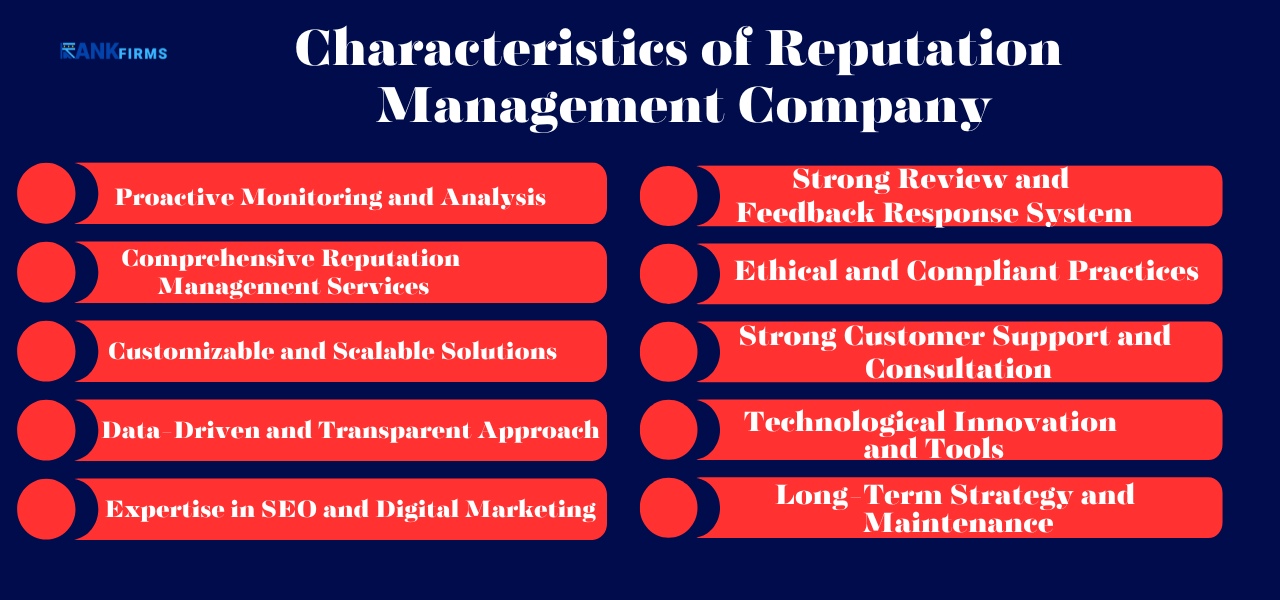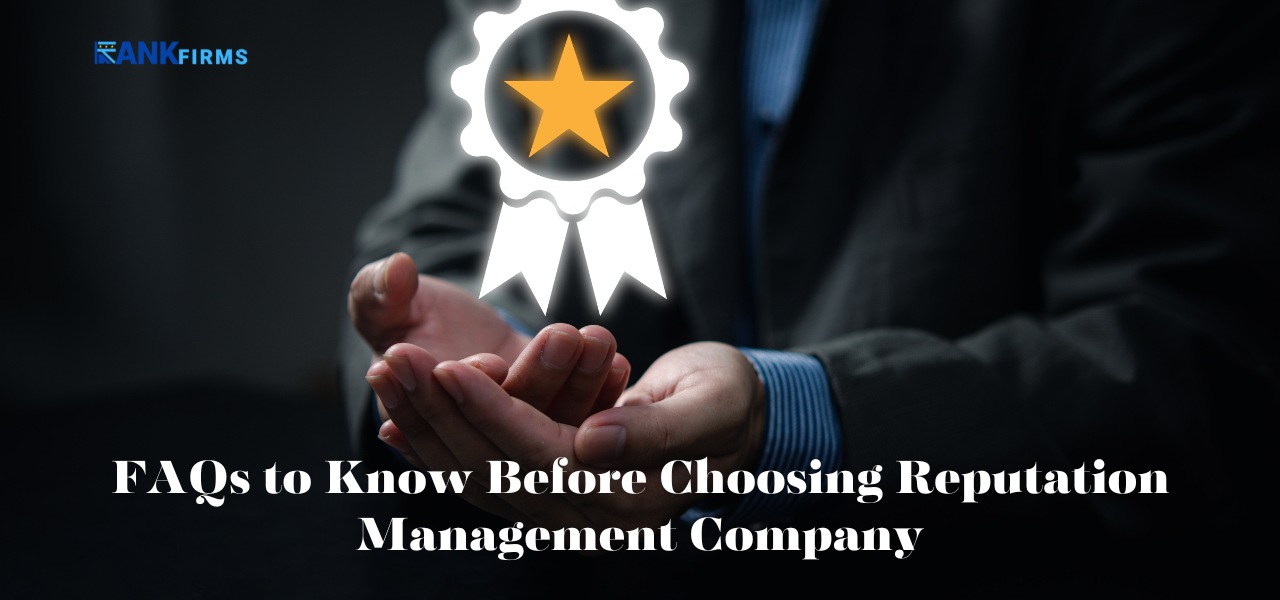Building reputation, whether online or offline, is an arduous task. Negative online attention can always pose a risk to the business hence it is essential to always arm yourself.
Did you know that it can take up to 3 years to recover from the impact of a negative online reputation? On the other hand, a company with good online reputation can double the value of their share price.
How Online Reputation Impacts Business?
82% of consumers avoid using a business with negative reviews.
79% of people trust online reviews as much as personal recommendations.
93% of consumers say online reviews impact their purchasing decisions.
Businesses risk losing 22% of customers when just one negative article is found by users considering buying their product.
50% of consumers will question a company’s competence if they have negative online reviews.
So how would you maintain your clean reputation online and continue to have lucrative business uninterrupted? With the help of a Reputation Management Company!
What Is The Role of A Reputation Management Company?
Reputation management companies are meant to assist businesses and individuals in maintaining, improving, or restoring their online reputation. Their role involves monitoring online mentions, addressing negative reviews or content, promoting positive reviews, and managing social media presence.
They use SEO, content creation, and public relations strategies to shape public perception, protect the brand image, and ensure that search results reflect a positive reputation. This is particularly important for businesses facing public scrutiny or those aiming to build customer credibility and trust.
Let’s learn, comprehensively, how they can enhance your brand’s value and provide you with more business.
Characteristics of Reputation Management Company
The best Reputation Management Companies USA possess specific characteristics that set them apart in their ability to manage, protect, and enhance a brand’s online image. These companies provide comprehensive strategies, personalized service, and measurable results. Here are the key characteristics of top reputation management companies:

1. Proactive Monitoring and Analysis
Continuous Monitoring:
Top companies actively monitor a wide range of online platforms, including social media, review sites, forums, blogs, and news outlets, to track all mentions of your brand. This allows them to address potential issues before they escalate.
Sentiment Analysis:
They analyze the tone and sentiment of mentions to determine whether they are positive, neutral, or negative, helping businesses respond appropriately.
Real-time Alerts:
They provide real-time alerts for any significant changes in a company’s online reputation, such as spikes in negative reviews or sudden media coverage, allowing for timely action.
2. Comprehensive Reputation Management Services
Online Review Management:
Effective reputation management companies specialize in review generation, encouraging happy customers to leave positive feedback, and constructively responding to negative reviews.
Content Creation and SEO:
They produce high-quality, positive content (blogs, articles, press releases) to push down negative search results and improve SEO ranking. This ensures that positive content appears first in search engine results when people look for the brand.
Social Media Management:
They manage and optimize social media profiles to ensure consistent brand messaging, engagement with the audience, and timely responses to feedback, both positive and negative.
Public Relations and Crisis Management:
Top IT Services Companies are skilled at handling PR crises, offering strategies to contain the damage and restore trust with customers. They have plans in place for crisis communication, ensuring that messaging is controlled and well-received.
3. Customizable and Scalable Solutions
Tailored Strategies:
The best reputation management companies provide personalized solutions based on a business’s unique industry, goals, and current online image. They understand that each company’s reputation needs are different and provide scalable solutions for businesses of any size.
Industry-Specific Expertise:
These companies often have experience in multiple industries, allowing them to cater to the specific challenges a company may face, whether it’s in healthcare, retail, finance, technology, or other sectors.
4. Data-Driven and Transparent Approach
Measurable Results:
Leading reputation management companies use data-driven strategies to measure success. They regularly provide detailed reports showing the impact of their work, such as improved search rankings, higher positive review volumes, and enhanced customer sentiment.
Clear KPIs:
They define clear Key Performance Indicators (KPIs), such as improvements in review scores, social media engagement, and search engine rankings, to track and demonstrate progress.
Transparency and Communication:
They maintain open and transparent communication with their clients, keeping them updated on all actions, strategies, and progress, ensuring the client is always informed about the status of their reputation.
5. Expertise in SEO and Digital Marketing
Search Engine Optimization (SEO):
A strong reputation management company excels in SEO, ensuring that positive content ranks high on search engines while harmful content is pushed down. This helps build long-term online credibility.
Content Marketing:
They are skilled in creating and promoting valuable, engaging content that improves a brand’s image and builds trust with its audience. This may include blogs, testimonials, case studies, or press releases that highlight the brand’s strengths.
Influencer and Social Media Marketing:
Many top companies also collaborate with influencers or engage in targeted social media marketing to further boost a company’s positive online presence.
Also Read: Top 8 Digital Marketing Trends 2024
6. Strong Review and Feedback Response System
Positive Engagement:
Leading companies know how to craft professional and timely responses to both positive and negative reviews. Their expertise lies in turning potentially damaging feedback into an opportunity to demonstrate strong customer service.
Resolution Strategies:
They have well-developed processes for resolving customer issues, demonstrating empathy, and converting unhappy customers into satisfied ones. This helps foster a positive perception of the brand over time.
7. Ethical and Compliant Practices
Transparency and Integrity:
The best companies focus on ethical reputation management tactics. They avoid black-hat SEO practices, fake reviews, or deceptive methods, ensuring compliance with industry regulations and maintaining the brand’s credibility.
Compliance with Guidelines:
They adhere to platform-specific guidelines and ensure that all content created or removed follows the rules of search engines, social media platforms, and review sites.
8. Strong Customer Support and Consultation
Dedicated Account Managers:
Many leading reputation management firms offer dedicated account managers who provide personalized support and understand the business’s goals and challenges.
Ongoing Consultation:
They offer ongoing consultation services to help businesses stay ahead of reputation challenges and adapt strategies as needed. This includes advice on improving internal practices, enhancing customer service, and optimizing digital strategies.
9. Technological Innovation and Tools
Advanced Tools:
The best companies use cutting-edge tools for monitoring, analyzing, and managing online reputation. These tools help in automating alerts, tracking brand mentions, and providing real-time feedback on the company’s digital presence.
AI and Analytics:
Some top reputation management firms utilize AI-powered analytics to better predict trends in customer sentiment and more effectively respond to issues. They also use analytics to optimize the timing and impact of positive content.
10. Long-Term Strategy and Maintenance
Ongoing Monitoring and Support:
Reputation management is not a one-time fix, and the best companies understand that. They offer long-term monitoring and reputation maintenance, ensuring that positive results are sustained, and any potential future issues are managed proactively.
Proactive Reputation Building:
In addition to repairing damaged reputations, top companies help build and strengthen a positive online image through long-term strategies like thought leadership, industry awards, and partnerships.
With all these benefits of hiring a reputation management firm for your business, you must also know whether you have picked the right one. You can always check and compare them from B2B marketplaces, such as Rankfirms, however it is always relevant to interview them.
FAQs to Know Before Choosing Reputation Management Company

1. What services do you offer for reputation management?
Why ask?
Understanding the full range of services offered (such as review management, content creation, SEO, social media monitoring, and crisis management) ensures the company meets all your needs.
Answer:
A reputable company will offer a range of services including online review management, SEO optimization, content creation, social media monitoring, public relations, crisis management, and overall brand reputation monitoring. They should tailor these services to fit your business needs.
2. How do you monitor my brand’s online presence?
Why ask?
This will give you insights into the tools and methods they use for real-time tracking of your online mentions across reviews, social media, forums, and other platforms.
Answer:
Top reputation management companies use advanced tools to continuously track brand mentions across various platforms like social media, review sites, blogs, and forums. They provide real-time alerts for any significant changes or mentions to address issues swiftly.
3. What is your approach to handling negative reviews or content?
Why ask?
Knowing their strategy for addressing negative feedback will help you understand how they can mitigate damage and turn issues into opportunities for improvement.
Answer:
They should emphasize responding to negative reviews professionally and promptly, working to resolve customer issues while highlighting positive content to minimize the impact of negative feedback. This might also include legal action for defamatory content if necessary.
4. Can you provide case studies or examples of past successes?
Why ask?
Reviewing their past work will give you an understanding of their expertise and the results they’ve achieved for other clients in similar industries.
Answer:
Reputable companies will have case studies or client testimonials that demonstrate how they improved a client’s online reputation, increased positive reviews, or handled crises. These examples should align with your industry and project needs.
Also Read: Direct Hire vs Contract-to-Hire: Which is Right for Your Business?
5. How long will it take to see measurable results?
Why ask?
Reputation management is a long-term investment, but it’s important to have realistic expectations about timelines for improving your online image.
Answer:
Reputation management is a gradual process. Most companies will explain that minor improvements may be visible within the first few months, but significant, lasting results often take six months to a year, depending on the complexity of the situation.
6. What kind of reporting and metrics do you provide?
Why ask?
Ensure they offer detailed reports on key metrics such as search engine ranking improvements, positive review volume, and sentiment analysis, so you can track their performance.
Answer:
They should offer detailed, regular reports showing changes in your online presence, such as review volumes, sentiment analysis, improved SEO rankings, and social media engagement metrics. Transparent reporting ensures you can track progress.
7. Do you offer SEO services as part of reputation management?
Why ask?
Since SEO is critical for pushing down negative content and promoting positive results, it’s important to know if they can handle this aspect of reputation management.
Answer:
Yes, most companies integrate SEO strategies to improve search engine rankings for positive content, ensuring it outranks negative or damaging content about your brand. This boosts visibility and helps control what potential customers see.
8. What is your crisis management process?
Why ask?
In the event of a PR crisis, you want to be confident that they have a proven process for mitigating damage quickly and efficiently.
Answer:
The company should have a proactive approach to handling crises, which includes assessing the situation quickly, developing a response strategy, and managing public communication to control the narrative. They should help you act swiftly to minimize damage.
9. How do you handle online reviews and review generation?
Why ask?
Learn how they will help you acquire positive reviews and address any negative ones, as reviews are critical to online reputation.
Answer:
They should help you encourage satisfied customers to leave positive reviews and respond professionally to negative ones. They might offer tools or strategies for review solicitation while also providing reputation repair for negative reviews.
10. What is your pricing model?
Why ask?
Reputation management costs can vary greatly depending on the scope and services. It’s important to understand the pricing structure (e.g., hourly rates, fixed fees) to ensure it aligns with your budget.
Answer:
Pricing models vary, but most companies offer either hourly rates, monthly retainers, or project-based fees. The cost depends on the complexity of the services needed and the size of your business. Expect clear, upfront pricing and a breakdown of what’s included.
11. Do you have experience in my industry?
Why ask?
Industry-specific knowledge is crucial for creating tailored strategies and understanding the specific challenges your business may face.
Answer:
Reputable companies will likely have experience across various industries, but they should demonstrate familiarity with the specific challenges and needs of your sector, offering customized solutions based on prior successes in your industry.
12. Will there be a dedicated account manager?
Why ask?
Knowing who will be your point of contact ensures you have consistent communication and that your account is managed with personal attention.
Answer:
Most leading reputation management companies assign a dedicated account manager to act as your point of contact. This ensures personalized service and consistent communication throughout the engagement.
13. What ethical practices do you follow in reputation management?
Why ask?
Ensure the company follows ethical and transparent practices, such as avoiding black-hat SEO tactics or fake reviews, which can harm your business in the long run.
Answer:
They should commit to ethical practices, avoiding black-hat SEO techniques, fake reviews, or unethical content removal. The focus should be on transparency, adhering to platform guidelines, and using legitimate methods to improve your reputation.
14. How do you measure success in reputation management?
Why ask?
Ask about their key performance indicators (KPIs) for success, such as increased positive reviews, improved search engine rankings, or enhanced customer sentiment.
Answer:
Success is typically measured through improved online sentiment, increased positive reviews, better search engine rankings, enhanced social media engagement, and improved customer perception. The company should define clear KPIs and goals tailored to your needs.
Also Read: Branding vs Marketing: Which Comes First in Business Strategy?
15. What kind of long-term support and maintenance do you offer?
Why ask?
Reputation management requires ongoing effort, so it’s important to know if they offer continuous monitoring and support to maintain your online reputation over time.
Answer:
Leading companies provide ongoing monitoring and maintenance services to ensure that your online reputation remains strong. This includes regular updates, addressing any new issues, and optimizing strategies as your brand grows.
16. Can you help with managing social media reputation?
Why ask?
Social media is a critical component of online reputation, and knowing how they plan to manage your brand’s image on these platforms is key.
Answer:
Yes, they should offer social media management, including monitoring mentions, responding to feedback, and ensuring a consistent and positive presence on platforms like Facebook, Twitter, Instagram, and LinkedIn to build and protect your brand’s image.

17. What happens if a major reputation issue arises during the contract?
Why ask?
Understanding how they handle unexpected reputation crises will ensure you’re prepared for potential challenges.
Answer:
If a major reputation issue arises, the reputation management company will typically activate a crisis management team. They will work with the business to craft a strategic response and provide real-time updates throughout the situation. Their primary focus will be on minimizing any reputational damage and ensuring a swift recovery.
18. Do you offer any guarantees on results?
Why ask?
While reputable companies won’t promise specific results (as reputation management is complex), it’s important to understand their commitments and realistic expectations.
Answer:
Most reputation management companies do not offer guaranteed results, as online reputation is influenced by various external factors beyond their control. However, they do commit to working diligently to improve a business’s online image. They set realistic expectations and provide clear, measurable goals as part of their process.
19. How do you ensure compliance with platform and legal guidelines?
Why ask?
Ensure they follow legal and platform-specific guidelines to avoid penalties or damage to your online presence.
Answer:
Reputation management companies stay up-to-date with legal and platform-specific guidelines to ensure compliance. From content creation to review management, all actions are designed to follow current rules, protecting businesses from potential penalties or reputational risks.
20. Do you offer training or support for my internal team?
Why ask?
Some companies offer training to your in-house team to help them better manage day-to-day reputation management tasks, which can complement external efforts.
Answer:
Yes, many reputation management companies provide training and support for internal teams. This can include best practices for managing customer feedback, handling reviews, and using social media effectively. Aligning internal efforts with external strategies helps create a consistent and effective approach to reputation management.
These questions will help you assess the capabilities, ethics, and approach of a reputation management company to ensure they align with your brand’s goals and values.
Conclusion
The best reputation management companies offer comprehensive, ethical, and data-driven services, ensuring that a business’s online image is consistently monitored and improved. They customize their strategies to align with the business’s unique needs and offer measurable results, ensuring transparency and effective reputation protection in the long run. These companies excel in providing digital marketing companies services like SEO, branding, marketing,, and crisis management, all while maintaining strong customer support and adhering to ethical practices.







